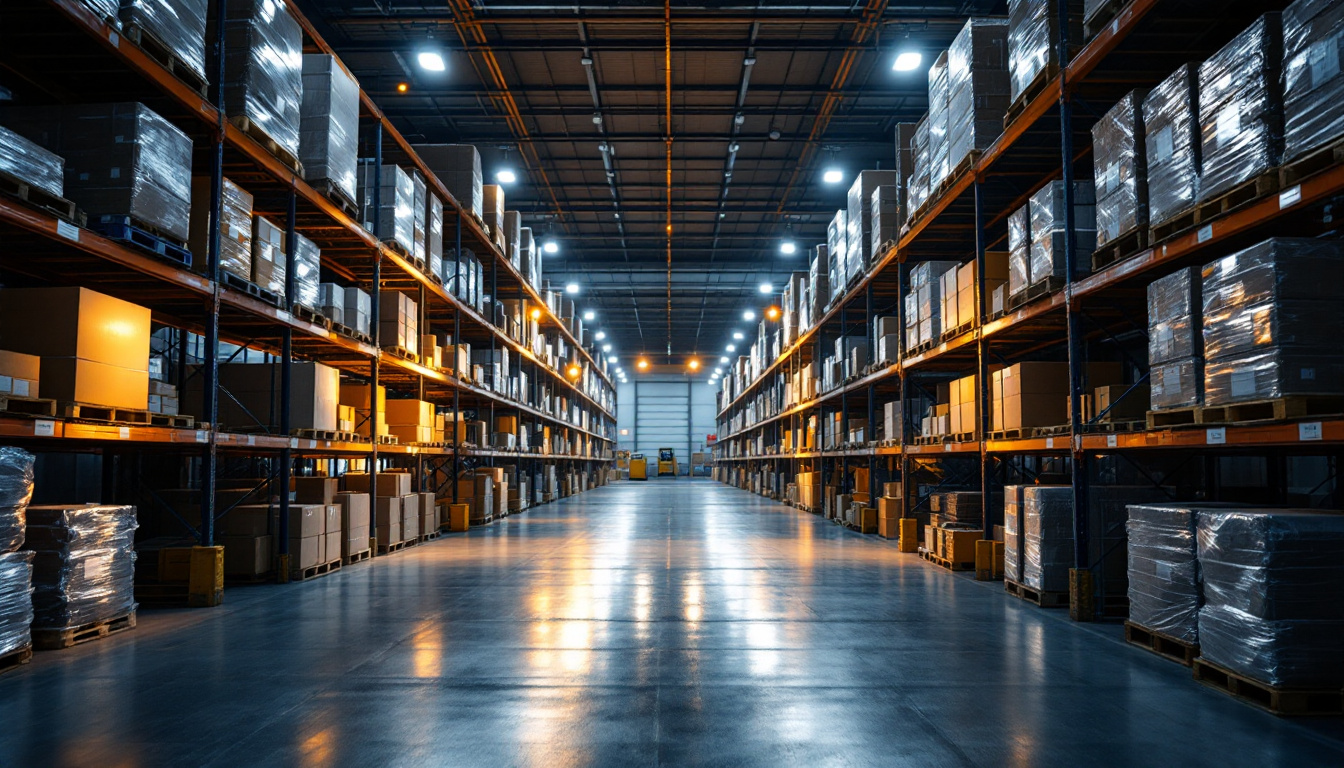

In the realm of industrial operations, effective warehouse lighting plays a critical role in enhancing productivity, safety, and overall efficiency. As lighting contractors, understanding the specific expectations of clients in this sector is essential for delivering optimal solutions. This article delves into the key aspects that clients expect lighting contractors to be well-versed in when it comes to warehouse lighting.
Every warehouse is unique, and clients expect lighting contractors to grasp the specific requirements of their operations. This understanding begins with a comprehensive assessment of the warehouse layout, the nature of the goods stored, and the activities performed within the space.
Clients expect contractors to evaluate the physical dimensions of the warehouse, including ceiling height, aisle width, and storage configurations. This assessment is crucial for determining the type and placement of lighting fixtures. A well-lit environment not only enhances visibility but also contributes to a more efficient workflow.
For instance, high ceilings may require specialized fixtures that can deliver adequate illumination at greater heights. Conversely, lower ceilings might benefit from different solutions that provide ample light without excessive glare. Understanding these nuances allows contractors to recommend tailored lighting solutions that meet clients’ operational needs. Additionally, considering the layout of shelving and racking systems is essential, as these can create shadows that impede visibility. By strategically placing lights to counteract these shadows, contractors can ensure that every corner of the warehouse is adequately illuminated, promoting safety and productivity.
Different areas of a warehouse may serve various functions, from storage to packing and shipping. Clients expect contractors to recognize the specific activities that occur in each zone and to provide lighting solutions that cater to those needs. For instance, areas where detailed work is performed, such as packing stations, may require brighter, more focused lighting compared to general storage areas.
Moreover, understanding the workflow can help in designing a lighting layout that minimizes shadows and enhances visibility, thereby reducing the risk of accidents and improving overall efficiency. In addition to brightness, the color temperature of the lighting can also play a crucial role in productivity. Warmer light may create a more inviting atmosphere in break areas, while cooler light can enhance alertness and focus in work zones. By taking into account the psychological effects of lighting, contractors can create an environment that not only meets the functional needs of the warehouse but also supports the well-being of its workers.
Clients expect lighting contractors to be knowledgeable about the relevant regulations and safety standards governing warehouse lighting. Compliance with these standards is not only a legal obligation but also a critical factor in ensuring the safety of warehouse operations. Proper lighting is essential for preventing accidents and ensuring that employees can perform their tasks efficiently and safely. Moreover, a well-lit environment can enhance productivity and morale among workers, making it a vital aspect of warehouse management.
The Occupational Safety and Health Administration (OSHA) sets forth guidelines that dictate minimum illumination levels for various work environments, including warehouses. Clients expect contractors to be familiar with these guidelines and to ensure that their lighting designs comply with them. This includes understanding the recommended foot-candle levels for different tasks and areas within the warehouse. For instance, areas where heavy machinery is operated may require higher illumination levels compared to storage areas, emphasizing the need for tailored lighting solutions.
By adhering to OSHA standards, contractors not only help clients avoid potential fines but also contribute to a safer working environment. This knowledge instills confidence in clients, knowing that their lighting solutions are both effective and compliant. Additionally, staying updated on any changes to OSHA regulations is crucial, as this can affect existing installations and future projects. Regular training and certification can further enhance a contractor’s credibility and expertise in this area.
In addition to safety regulations, clients are increasingly concerned about energy efficiency and sustainability. Many warehouses are implementing energy-efficient lighting solutions to reduce operational costs and minimize their environmental impact. Contractors are expected to be knowledgeable about energy-efficient technologies, such as LED lighting, and to recommend solutions that align with clients’ sustainability goals. The shift towards smart lighting systems, which can be controlled and adjusted based on occupancy and daylight availability, is also gaining traction, providing even greater energy savings and operational flexibility.
Understanding local energy codes and incentives can also be beneficial. Clients appreciate contractors who can guide them in selecting lighting solutions that not only meet their operational needs but also contribute to energy savings and potential rebates. Furthermore, being aware of the latest advancements in lighting technology, such as the integration of IoT (Internet of Things) for real-time monitoring and control, can set contractors apart in a competitive market. This proactive approach not only enhances the value of the services offered but also positions contractors as trusted partners in their clients’ sustainability journeys.
The lighting industry is constantly evolving, with new technologies and innovations emerging regularly. Clients expect lighting contractors to stay informed about the latest advancements and to incorporate these innovations into their designs.
LED lighting has revolutionized warehouse illumination due to its energy efficiency, longevity, and versatility. Clients expect contractors to understand the benefits of LED technology, including reduced energy consumption and lower maintenance costs. Additionally, LED lights can be dimmed or controlled through smart systems, allowing for greater flexibility in lighting design.
Contractors should also be able to explain the various types of LED fixtures available, such as high-bay lights for tall ceilings or linear fixtures for aisles. This knowledge enables contractors to recommend the most suitable options based on the specific needs of the warehouse.
As warehouses increasingly adopt automation and smart technologies, clients expect lighting contractors to be familiar with smart lighting systems. These systems can be integrated with sensors and controls to optimize energy use and enhance operational efficiency.
For example, motion sensors can automatically adjust lighting levels based on occupancy, ensuring that lights are only on when needed. Clients appreciate contractors who can provide insights into how these systems can be implemented and the potential return on investment they offer.
Clients often seek customized lighting solutions that cater to their specific operational needs. Lighting contractors are expected to demonstrate flexibility in their designs, adapting to changes in warehouse layouts or operational requirements.
Every warehouse has its unique challenges and requirements. Clients expect contractors to offer tailored lighting designs that consider factors such as the types of products stored, the layout of shelving, and the workflow of employees. This customization may involve creating different lighting zones within the warehouse, each with its own specific requirements.
For instance, a warehouse that handles both fragile items and heavy machinery may require different lighting solutions to accommodate the varying needs of each section. Contractors who can provide bespoke solutions are more likely to build lasting relationships with their clients.
Warehouses are dynamic environments, often undergoing changes in operations, layout, or inventory. Clients expect lighting contractors to design systems that can adapt to these changes. This may involve using modular lighting solutions that can be easily reconfigured or expanded as needed.
By demonstrating an understanding of future scalability, contractors can reassure clients that their lighting investments will remain relevant and effective over time.
Clients are often working within specific budget constraints, and they expect lighting contractors to provide solutions that deliver value without compromising quality. Understanding cost considerations is crucial for building trust and ensuring client satisfaction.
While clients may initially focus on the upfront costs of lighting solutions, savvy contractors will emphasize the long-term savings associated with energy-efficient systems. Clients expect contractors to provide a clear breakdown of costs, including installation, maintenance, and potential energy savings over time.
By presenting a comprehensive cost analysis, contractors can help clients make informed decisions that align with their financial goals. This approach not only fosters transparency but also positions contractors as trusted advisors in the decision-making process.
Many clients appreciate the availability of financing options that can ease the burden of upfront costs. Contractors who can offer insights into financing solutions, such as leasing or energy efficiency incentives, can enhance their value proposition. Clients expect contractors to be knowledgeable about available programs and to assist them in navigating these options.
Once a lighting system is installed, clients expect ongoing support and maintenance from their lighting contractors. This aspect is critical for ensuring the longevity and performance of the lighting solutions provided.
Clients appreciate contractors who offer regular maintenance plans to ensure that lighting systems remain in optimal condition. This may include routine inspections, cleaning, and timely replacement of any faulty components. By proactively addressing maintenance needs, contractors can help clients avoid unexpected downtime and costly repairs.
Furthermore, having a maintenance plan in place can extend the lifespan of lighting fixtures, ultimately providing better value for the client’s investment.
In addition to maintenance, clients expect contractors to provide responsive customer support. Whether it’s addressing concerns about lighting performance or assisting with troubleshooting, having a reliable support system in place is essential for client satisfaction.
Contractors who prioritize communication and are readily available to assist clients build stronger relationships and foster trust. This level of support can set a contractor apart in a competitive market.
In summary, effective warehouse lighting is a multifaceted endeavor that requires a deep understanding of clients’ needs, compliance with regulations, knowledge of lighting technology, and a commitment to ongoing support. Lighting contractors who can meet these expectations are well-positioned to deliver exceptional value and build lasting relationships with their clients.
By staying informed about industry trends, embracing innovation, and prioritizing customization and client support, contractors can not only meet but exceed client expectations in the realm of warehouse lighting. The ability to provide tailored, efficient, and compliant lighting solutions will ultimately contribute to the success of both the contractor and the client.
Ready to elevate your warehouse lighting projects with the best in the industry? At LumenWholesale, we provide lighting contractors with the high-quality, spec-grade lighting products you need at unbeatable wholesale prices. Our extensive selection not only meets but exceeds industry standards, ensuring your lighting solutions are reliable and high-performing. With free shipping on bulk orders, we make it easy and cost-effective to stock up on superior lighting products. Don’t let middleman markups affect your bottom line. Choose LumenWholesale for the perfect blend of quality, affordability, and convenience. Take the next step in exceeding your clients’ expectations and explore our Wholesale Lighting at the Best Value today.

Discover the ultimate guide to selecting the best high bay lights and effectively training your team in lighting solutions.

Discover the essential insights every lighting contractor needs to know about shop lights.

Discover the essential insights lighting contractors need about metal halide lamps, from their energy efficiency and lifespan to installation tips and safety considerations.

Discover how industrial warehouse lighting fixtures are transforming spaces with real-world success stories.
Get notified when NEW deals are released.
Optimize your budget with wholesale discounts.
Only top-quality, specification-grade lighting products.
No additional costs at checkout - what you see is what you pay.
We understand the unique needs of contractors.